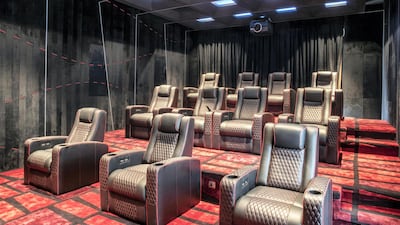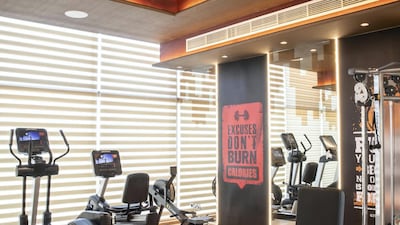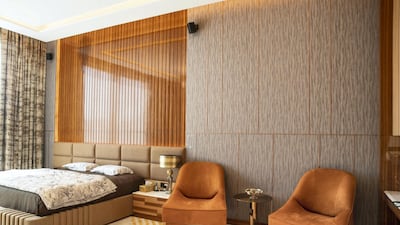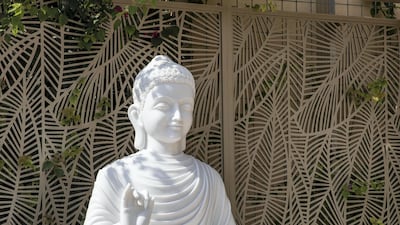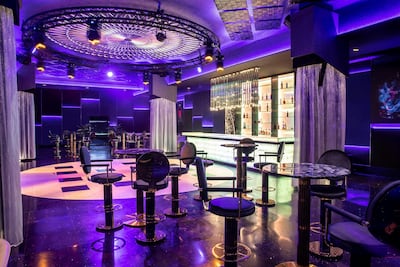The first thing you notice when you walk up to Manu Jeswani’s imposing four-storey home in Dubai’s Emirates Hills is its name: Sapna. Meaning dream in Hindi, it’s not only the name of Manu’s wife of 38 years, but also a symbolic realisation of all the things they set out to achieve as a couple.
"When we got married, we had nothing, so this home is like a dream come true for us," says Manu, a shareholder in the Landmark Group and one of the group directors of the conglomerate with headquarters in Dubai. He is seated on a Roberto Cavalli-branded sofa in the lounge area on the property's ground floor. A Fendi carpet lies underfoot and above hangs a massive chandelier, one of four that were custom-made by Italian company Vetrart, which is famed for its handcrafted glass designs.
Spread across 28,500 square feet, the five-bedroom Jeswani residence is expansive, considering its only permanent residents are the couple, their son Manish, 34, and a few members of staff. Their daughter Anjali, who is married but lives elsewhere in Dubai, still has a bedroom in the house and visits at least once a week.
The ground floor is divided into three main open-plan areas: a lounge and bar area, a formal seating area and a formal dining area. Next to the formal dining space is a large kitchen and an additional dining room, which the family uses daily. Two guest bedrooms, complete with walk-in closets, are located close to the foyer on the same floor.
On the first floor is the master bedroom, which overlooks the golf course, a luxurious cinema and Manish and Anjali’s bedrooms. One floor up, you are greeted by a puja room, dedicated to the Hindu deity Ganesha, a fully loaded gym on one side, and a lounge and entertainment space on the other, which also emerges on to an outdoor rooftop area.
The property's piece de resistance, however, sits in the basement, and is unsurprisingly Manish's favourite part of the house. Much of the space is occupied by a full-fledged club, which can host more than 100 people and easily rivals any top nightspot in the UAE. It comes with a decked-up DJ station, and light and sound system with giant multimedia screens. A pool table room and cards room are tucked in a corner. Outside, there's a spa room, salon, cellar and parking space for six cars.
An elevator serves each of the floors, while the entire property is monitored through a smart -home system, which can be controlled using a phone. This extends to the lights, including those on the chandeliers, which can be manipulated according to one's mood.
“This is like a resort for us. We don’t have to go anywhere,” Sapna says. “Each space has been utilised perfectly, and I wouldn’t change anything about it.”
Notably, this is not the first "dream home" that the Jeswanis have built. The first one, constructed on the same piece of land, was razed three years ago because, as Sapna puts it, “we wanted a basement. We tried to refurbish the old house, but as we kept modifying, the designer suggested that our money would be better spent just building a new house."
The Jeswanis bought the 34,000-square-foot plot in Emirates Hills for Dh3.2 million in 2003 and built their first home, then spread across 12,500 square feet, at the cost of Dh10 million. Manu estimates that the new house, which was completed in April this year, would be worth Dh70 million. “But we’re not selling,” he quickly adds. “We put our heart and soul into this."
"And we have no interest in giving it away, for now,” Sapna adds.
The couple, who used to travel frequently before coronavirus restrictions, said they worked closely with interior designer Badal Bavaria to finalise the mood of the house. Bavaria accompanied them on many of their travels to source choice items. When it comes to furniture, Sapna is partial to brands in Italy, where she attended two design fairs along with the interior designer. “You get the latest there and more options,” she says. “We wanted the overall look to be chic and modern, but with subtle colours.”
Furnishing the house cost a little more than Dh30 million, including the chandeliers, according to Manu, which cost 25 per cent more than he budgeted for. Nothing from the old house made it to the new one. “Things kept changing as we started decorating and filling up the house. And because we wanted the best, we didn’t want to cut any corners,” he says.
While Manish’s favourite part of the house is the basement, Sapna’s is the puja room. “It’s so peaceful, and I pray there every day. Having that room was very important to me,” she says. Anjali, a fashion designer, says she loves the lounge. “It’s a chilled-out area and I love watching matches here,” she says.
For Manu, it’s the entire house. “The speciality of this house is the height. If you are somewhere with low ceilings, you feel very tired. With the whole house, we wanted to make sure it’s open, with lots of breathing space and very high ceilings,” he says. “Also, the house is large, but it’s cosy. We wanted it to look like a home, not a hotel.”
Before coronavirus-imposed social restrictions, the Jeswanis would entertain at least three times a week. They hope to be able to do that again soon. “You could call us socialites,” Manu laughs.
But beyond that, he says he’s content that the home he now lives in is one that has surpassed anything he once dreamt of.
“When Sapna joined me in Bahrain in 1982, we lived in a rented one-bedroom apartment. Both my children were born in that apartment,” recalls Manu, who began working with the Landmark Group in 1978 as a store manager in Shoemart. “We bought a second-hand car and we didn’t have any help. We didn’t have much, but we were happy.”
The family moved to Dubai in 1990, and Manu has been with the company for more than 40 years. “I never imagined I could afford a house like this. I just wanted to be successful, but how successful, we didn’t have any idea,” he says. “Sometimes things turn out better than you plan, and this house is what that is.”





